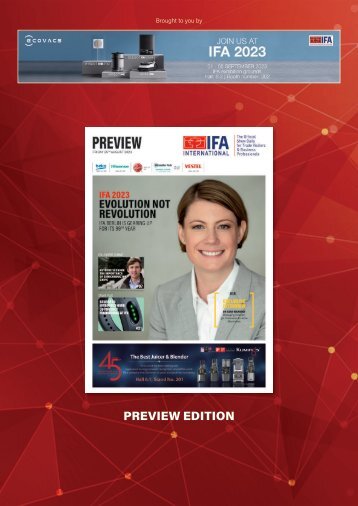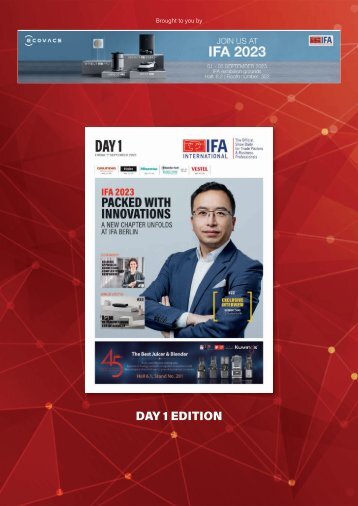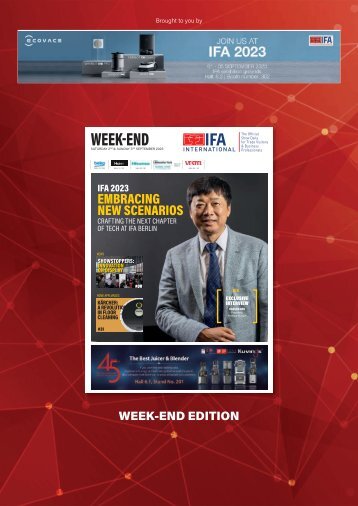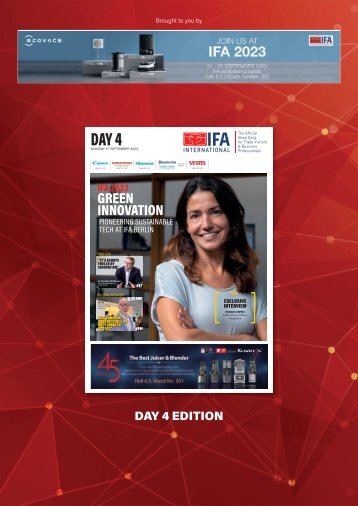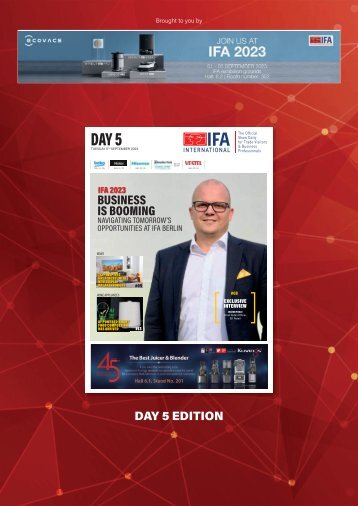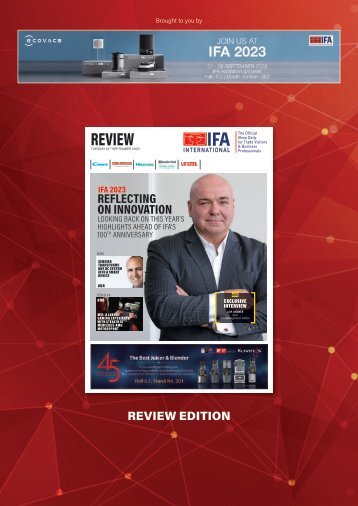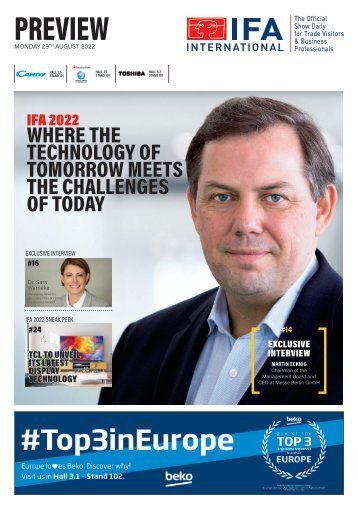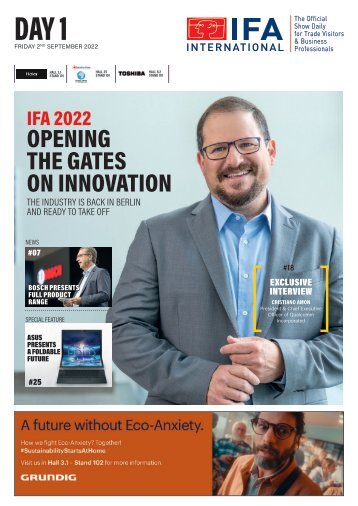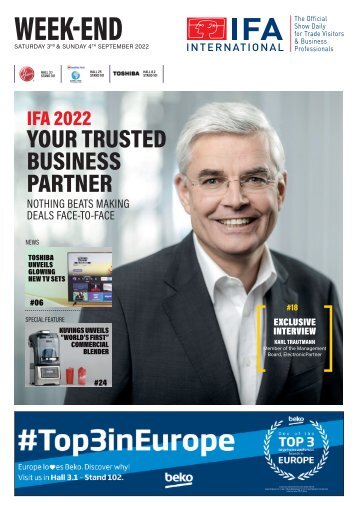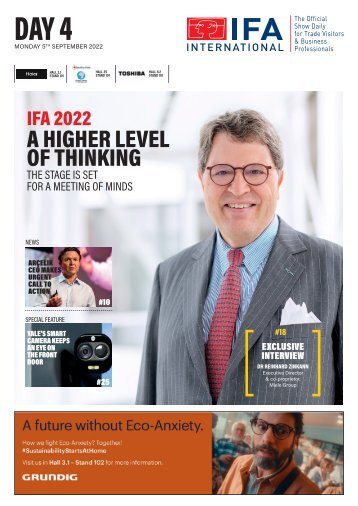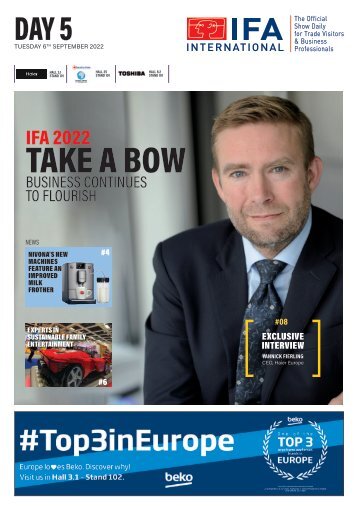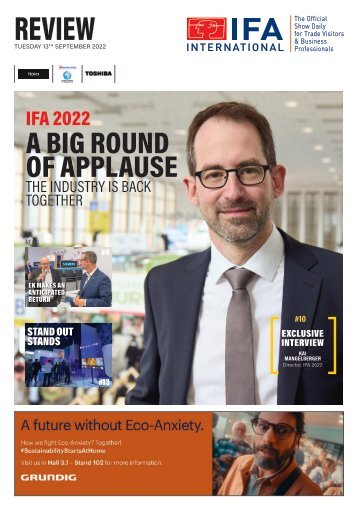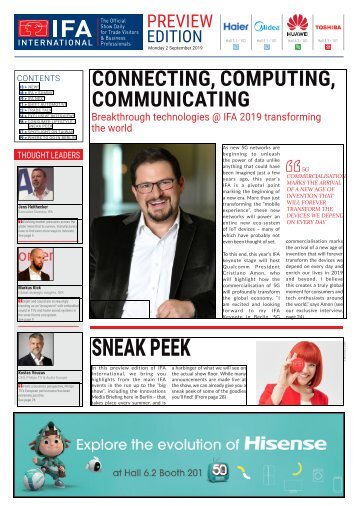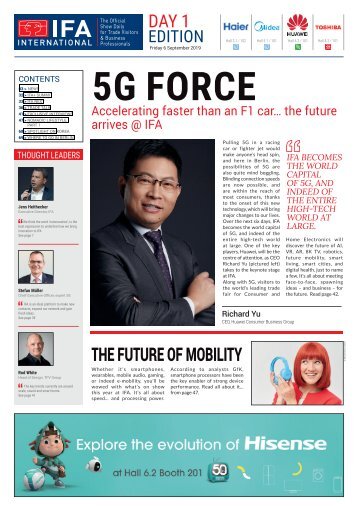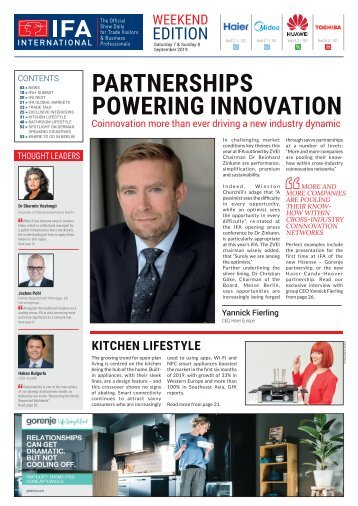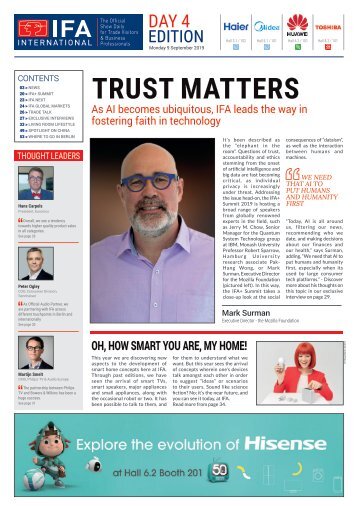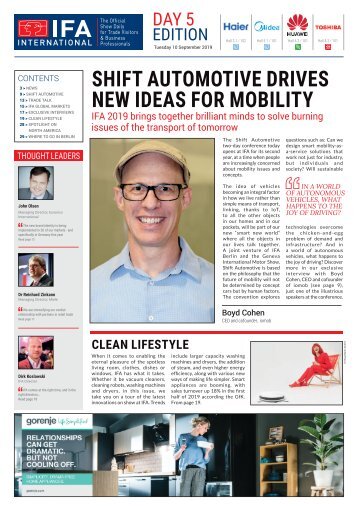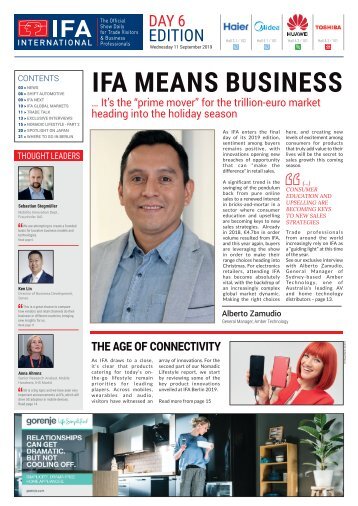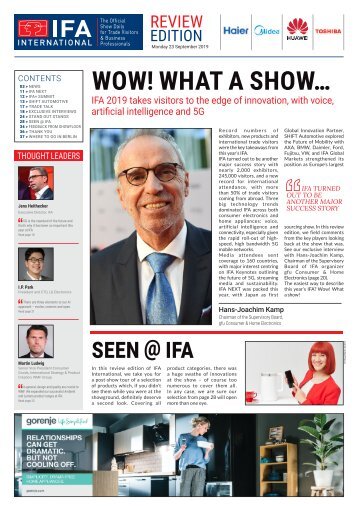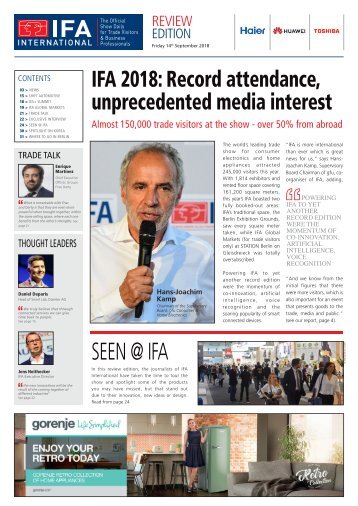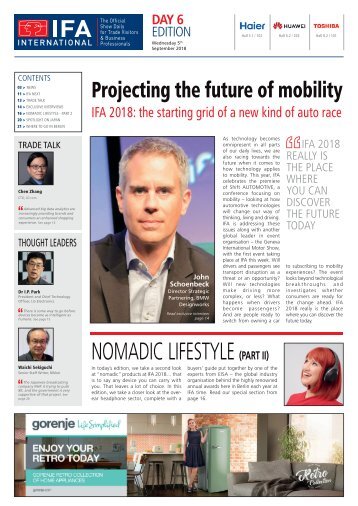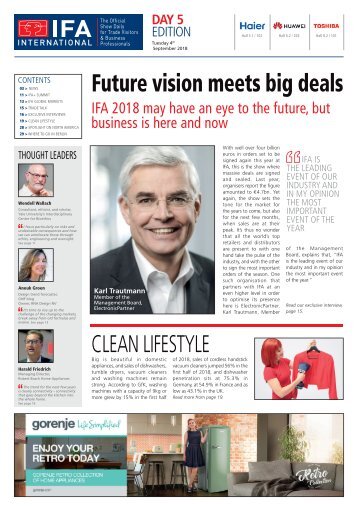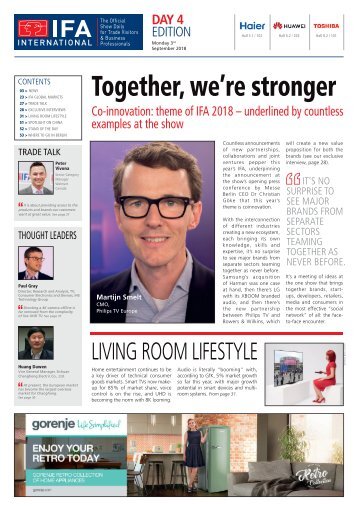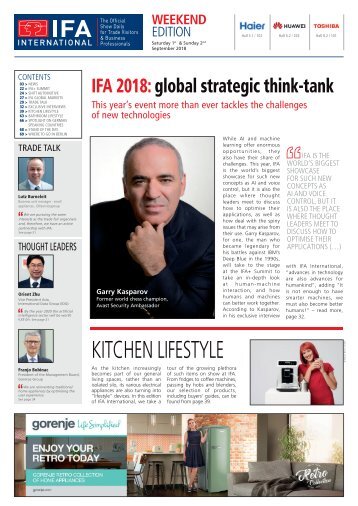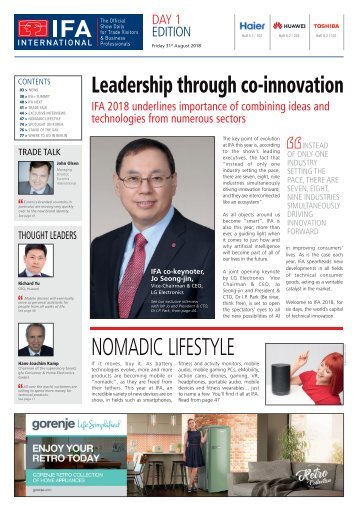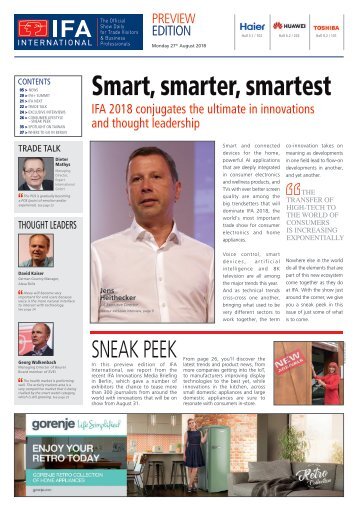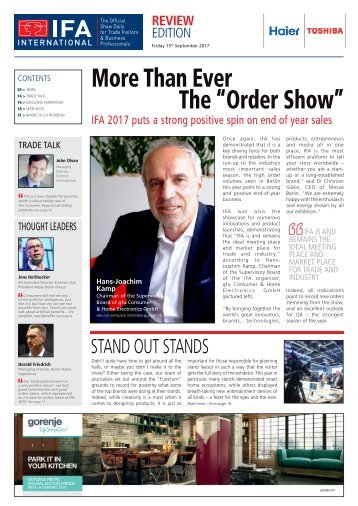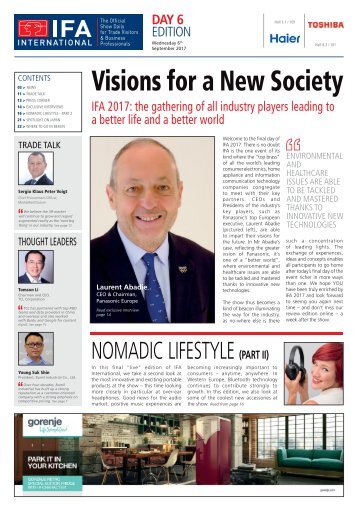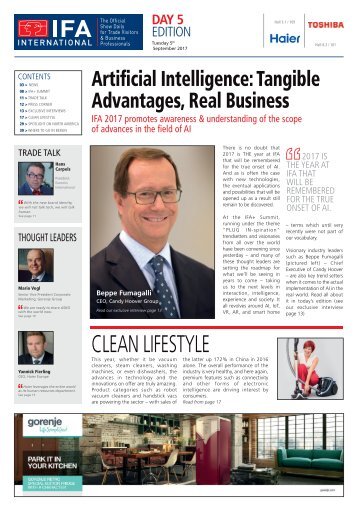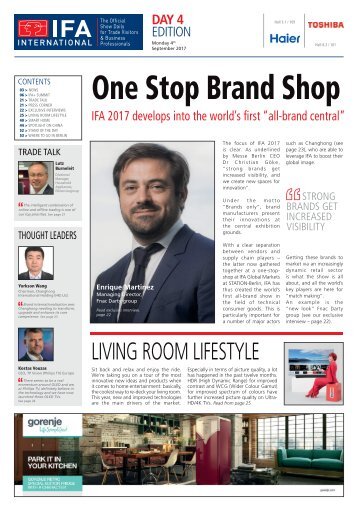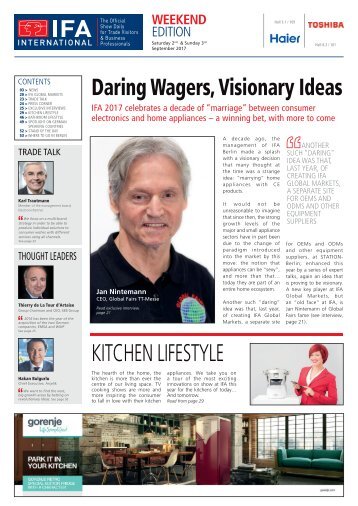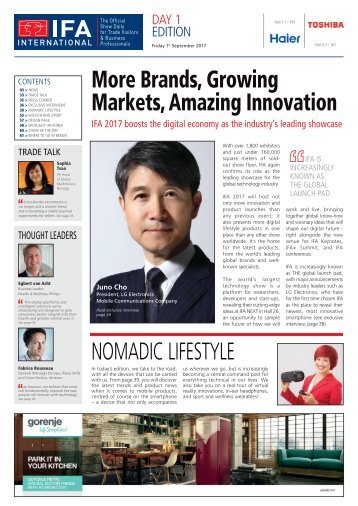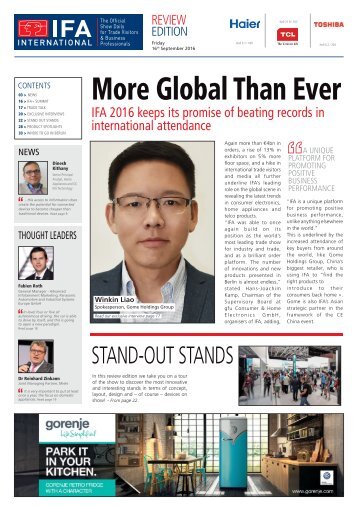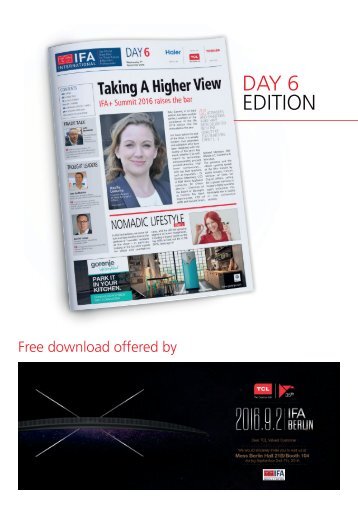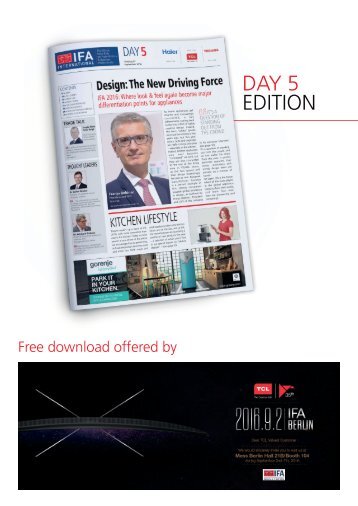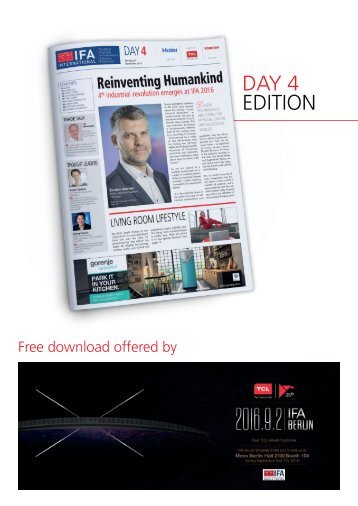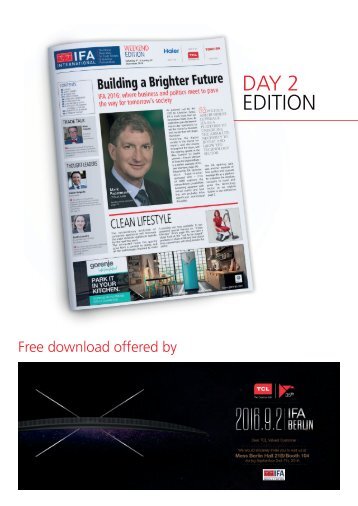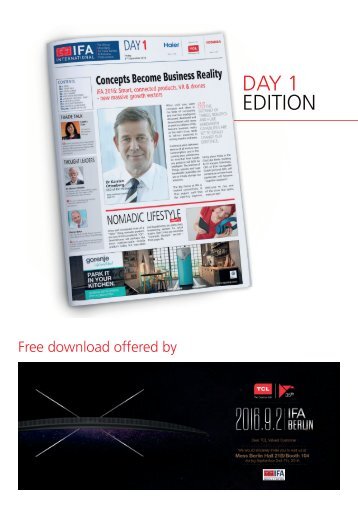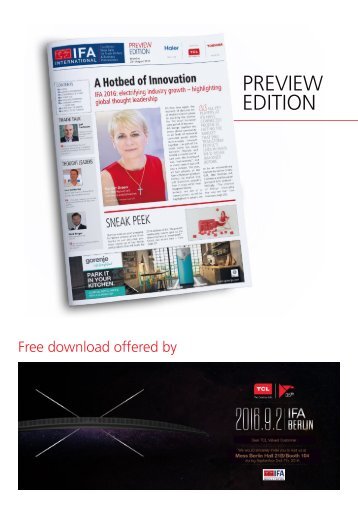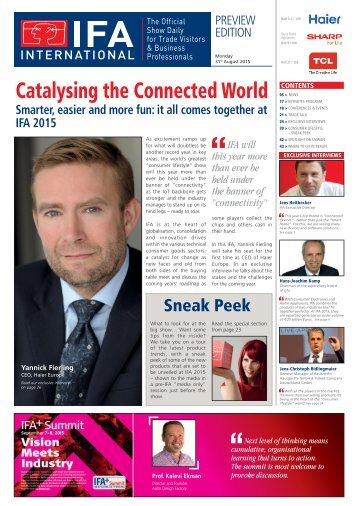
Day 5 - IFA International
- Text
- Products
- Digital
- Consumer
- September
- Panasonic
- European
- Berlin
- Trends
- Consumers
- Features
- Www.cleverdis.com
ExclusivE intErviEw A
ExclusivE intErviEw A JApAnEsE GiAnt ADDs tHE FrEncH tOucH MEEt lAurEnt AbADiE - tHE First nOn-JApAnEsE cHAirMAn AnD cEO OF pAnAsOnic EurOpE By Richard Barnes Traditionally very “strongly” Japanese, Panasonic, one of the main players in the Consumer Electronics field today, made a very bold move by appointing their first non-Japanese European “boss” earlier this year – Frenchman Laurent Abadie – largely responsible for the company’s success in camera and TV sales on the continent. IFA International met with Mr Abadie to discuss his new position. Laurent Abadie, Chairman and CEO of Panasonic Europe You are the first non- Japanese Chairman and CEO of Panasonic Europe in the group’s entire history. It has now been a couple of months since you took up the position… how has it gone so far, how does it feel to head-up such a large company? It’s interesting, because it has come at a time when Panasonic is really focusing on overseas business. It’s a priority to develop our image outside Japan and my role is really to change the corporate culture and also to bring together what the market needs and what we are developing for the future. This is very obvious when we are in upper management meetings in Japan, there is an openness to new ideas and there are big expectations for me to really make a difference… Is there a lot of pressure? No it’s all extremely positive. I have now been working in a Japanese electronics environment for 28 or 29 years and I understand the job, the culture and the consumers. But most of all, I relish the prospect of breaking-down barriers and doing a good job for the company. What are the new directions that you would like to see adopted within Panasonic Europe? I’d like to see Panasonic becoming a company that is prepared to take the lead in terms of innovation. Panasonic has in the past been seen as a rather conservative company. And although this is not necessarily a negative trait, it has been a reality. But now it’s time to change But that conservative culture was intentional, wasn’t it? Yes, but I would like to see more innovation and more risk-taking in order to get ahead of the competition. So we are looking at every area of the company in order to really accelerate progress towards being a very up-todate company. 8 www.ifa-international.org IFA International • Tuesday, 8 th September 2009
ExclusivE intErviEw Panasonic’s results have been relatively healthy this year. Has the current economic uncertainty affected the way that you operate the business at Panasonic Europe? Has it changed in any way? The company is profitable in terms of operating costs because we reduced our fixed costs very effectively. However we are also intending to change certain directions within the company. In Europe, we have sixteen factories, three R&D centres and one design centre and there is no plan to close any factories or research facilities. Europe is going quite well overall, and we are growing in terms of market share everywhere, by product category but also by country, and we feel a kind of recovery. By that I mean that our sales results, during the summer, showed growth compared to last year, which is a good sign. Of course we know that Panasonic is focused at the moment on 3D technology. Why is Panasonic so optimistic about this development, and how will you go about marketing this to the consumers? We feel that it’s a new revolution, after black and white TV, colour TV, HD, flatscreen TVs, the 3D Full-HD TV is really a logical next step, because you can be inside the action when you watch a movie or a sporting event. It’s honestly a really amazing experience. Our strength is that we are probably the only one to control the whole 3D supply chain. It goes all the way from the Hollywood studios, because we have an R&D centre over there, called the Panasonic Hollywood Laboratory. The centre is currently actively developing technologies with various Hollywood studios. We are producing broadcast 3D cameras with dual lenses to make films, and we will introduce 3D Blu-ray and 3D TVs soon, so we have the whole supply chain up and running, all the way from the studios to the living room. The key issue with 3D, of course, is the hardware, but experiencing it is also very important. Then of course the fact that all the Hollywood studios are now producing movies in 3D will also serve to drive demand. And Panasonic is working very closely with James Cameron… Yes, this is for the film Avatar, a 3D project, which will be released in December. The games industry is also planning most of the next generation of games in 3D, which is very important, and the step after that will be to broadcast in 3D. So the first 3D TV is for 2010… Will that be in the US and Europe? Yes, I think that’s a reasonable estimate. For movies from Hollywood, it’s already happening, but for broadcasts, it will take maybe two or three years more. What is the future in terms of sustainable products and manufacturing practices for Panasonic? Well, our mid-term strategy is really to focus on energysaving and storage products, because we feel that the planet is moving from an oildriven economy to a more sustainable one, and therefore we will focus on energy storage, because we will all need to store energy at home and in the car, and we will all also need to get involved in energy management. This is really a clear direction for growth. We are demonstrating fuel cell technology here in the booth at IFA, and it will come to Europe. Of course it will take some time, because we need to make various agreements with utility companies. What about developing solar panels as well? This issue is very important, that’s why we are ramping up our ongoing projects in this area. Could you give us a general comment about IFA this year? What would you say is the most exciting thing that Panasonic has at IFA this year? 3D Full HD is one of the main things for the company, and I would also say that the Lumix camera which we are introducing which comes with compact interchangeable lenses is very important. It has the same quality as a full size SLR but in a very compact form. For the moment we have the pancake and two other wide lenses, and in total we have six different lenses. It is a really great product, and our market share is growing very fast in Europe with Lumix. In France we are number one with 27% of the market and in Germany, we have a 20% share. Finally, how important is IFA for Panasonic as an event in terms of announcing new products to the world? It is an extremely important show especially in terms of reaching out to consumers and resellers in the European market. IFA International • Tuesday, 8 th September 2009 www.ifa-international.org 9
- Page 1: IFA: The Ultimate Trading Center Do
- Page 5: news canon iF design winners at iFa
- Page 11 and 12: EXCLUSIVE INTERVIEW DESIGN STRATEGI
- Page 13: SPECIAL FEATURE: CAmERAS & oPTICAL
- Page 16 and 17: SPECIAL FEATURE: CAmERAS & oPTICAL
- Page 19: PRODUCT TRENDS KEEPING AN EYE ON TH
- Page 23: CAFÉ CORNER DE'LONGHI: A LITTLE TA
- Page 26 and 27: at w w w.ifa-international.org at w
- Page 29 and 30: Buying and Promoting green How Carr
- Page 31 and 32: trade news consumer trends in the U
- Page 33 and 34: trade news sUPersIZe strateGIes Lar
- Page 35: TRADE TRENDS HOME IS WHERE THE CUST
- Page 38: going out > tHe SapHire Bar Pure El
Inappropriate
Loading...
Mail this publication
Loading...
Embed
Loading...

IFA International
- IFA International 2023
- IFA International 2022
- IFA International 2020
- IFA International 2019
- IFA International 2018
- IFA International 2017
- IFA International 2016
- IFA International 2015
- IFA International 2014
- IFA International 2013
- IFA International 2012
- IFA International 2011
- IFA International 2010
- IFA International 2009
- IFA International 2008
- IFA International 2007
